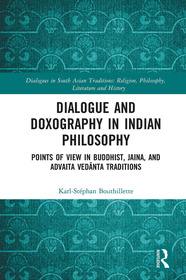
Dialogue and Doxography in Indian Philosophy
Points of View in Buddhist, Jaina, and Advaita Vedānta Traditions
Series: Dialogues in South Asian Traditions: Religion, Philosophy, Literature and History;
- Publisher's listprice GBP 42.99
-
20 538 Ft (19 560 Ft + 5% VAT)
The price is estimated because at the time of ordering we do not know what conversion rates will apply to HUF / product currency when the book arrives. In case HUF is weaker, the price increases slightly, in case HUF is stronger, the price goes lower slightly.
- Discount 20% (cc. 4 108 Ft off)
- Discounted price 16 430 Ft (15 648 Ft + 5% VAT)
Subcribe now and take benefit of a favourable price.
Subscribe
20 538 Ft

Availability
Estimated delivery time: In stock at the publisher, but not at Prospero's office. Delivery time approx. 3-5 weeks.
Not in stock at Prospero.
Why don't you give exact delivery time?
Delivery time is estimated on our previous experiences. We give estimations only, because we order from outside Hungary, and the delivery time mainly depends on how quickly the publisher supplies the book. Faster or slower deliveries both happen, but we do our best to supply as quickly as possible.
Product details:
- Edition number 1
- Publisher Routledge
- Date of Publication 13 December 2021
- ISBN 9781032237633
- Binding Paperback
- No. of pages222 pages
- Size 234x156 mm
- Weight 326 g
- Language English
- Illustrations 10 Illustrations, black & white 220
Categories
Short description:
This is the first book fully dedicated to Indian philosophical doxography. It looks at Indian doxography both as a witness of inter and intra sectarian dialogues, and as a religious phenomenon.
MoreLong description:
This is the first book fully dedicated to Indian philosophical doxography. It examines the function such dialectical texts were intended to serve in the intellectual and religious life of their public. It looks at Indian doxography both as a witness of inter- and intra-sectarian dialogues and as a religious phenomenon. It argues that doxographies represent dialectical exercises, indicative of a peculiar religious attitude to plurality, and locate these ‘exercises’ within a known form of ‘yoga’ dedicated to the cultivation of ‘knowledge’ or ‘gnosis’ (jñana).
Concretely, the book presents a critical examination of three Sanskrit doxographies: the Madhyamakah¿dayakarika of the Buddhist Bhaviveka, the ¿a¿darsanasamuccaya of the Jain Haribhadra, and the Sarvasiddhantasa¿graha attributed to the Advaitin Sa¿kara, focusing on each of their respective presentation of the Mima¿sa view.
It is the first time that the genre of doxography is considered beyond its literary format to ponder its performative dimension, as a spiritual exercise. Theoretically broad, the book reaches out to academics in religious studies, Indian philosophy, Indology, and classical studies.
"[This book] puts forward an innovative and attractive argument that the Indian doxographies he studies are not "objective" summaries of different contemporary Indian schools nor simply mnemonic forms for learning about and ranking one's opponents, but are rather pedagogical devices intended to draw the pupil towards an understanding of reality which surpasses conceptual formulations."
-Jacqueline G. Suthren Hirst,Journal of Dharma Studies
MoreTable of Contents:
Acknowledgements;
Preface;
Introduction;
1 The beginnings of Madhyamika doxography: Bhaviveka’s MHK;
2 The beginnings of Jaina doxography: Haribhadra’s ¿DS;
3 The beginnings of Advaita doxography: Sa¿kara’s SSS;
Conclusion;
Bibliography;
Index
More




